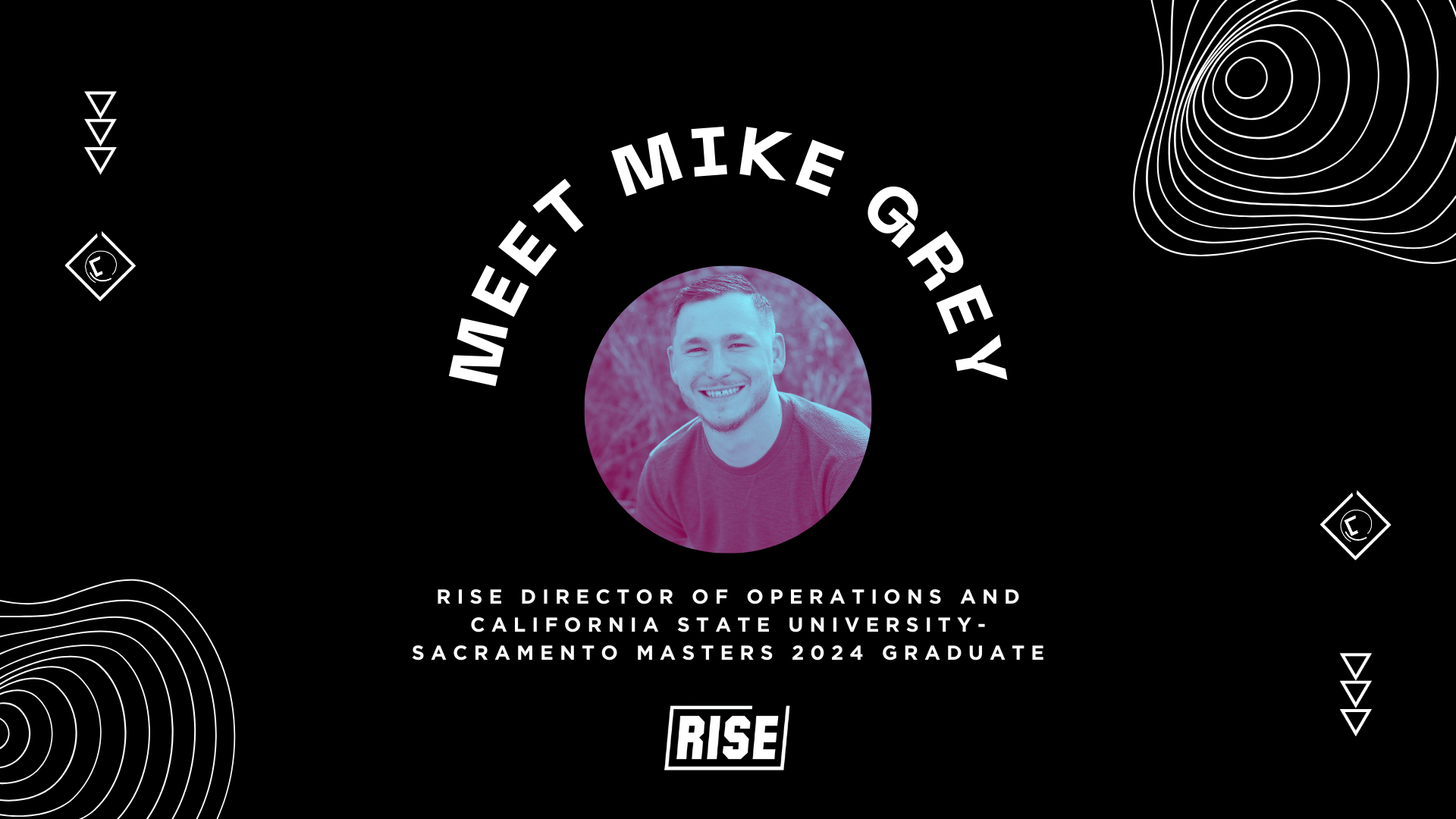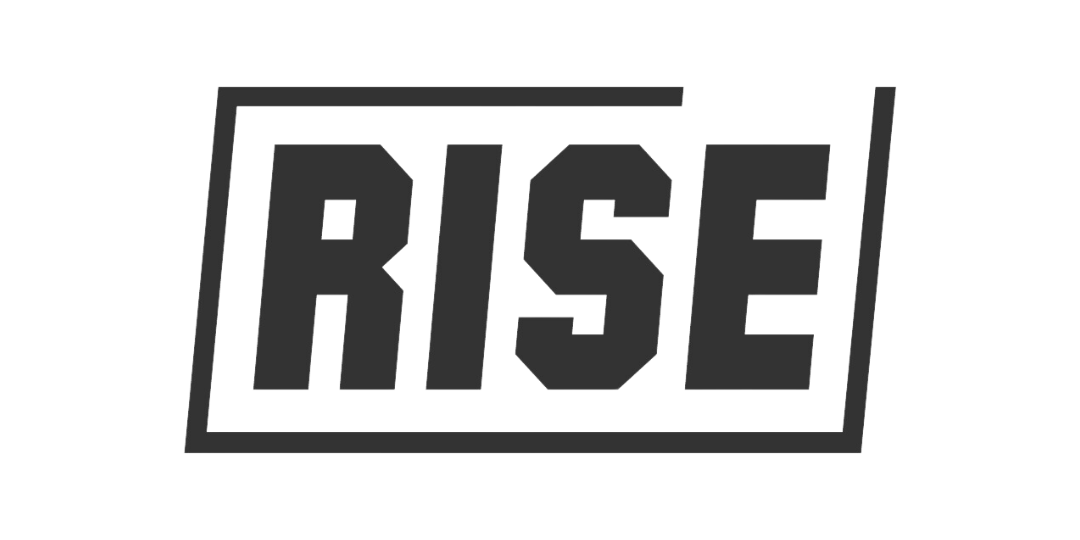Watch the video or read the blog below!
What inspired you to get involved in community organizing and advocacy? What experiences have led you to Rise?
Hi everyone, my name is Mike Grey, and I am RISE’s current director of operations. I started out as a student navigator on the basic needs side of the organization when I was an undergraduate student at University of California Merced. I am now a Master’s graduate student graduating this spring with my master’s in higher education leadership and policy studies. There are so many different reasons why I am inspired and attracted to working at a place like RISE. I am very invested in community and I’m very invested in ensuring that folks have accessible education, especially coming from a foster care background and coming from a low-income first-generation background. College is something that was my way out. It was very important for me to invest in my education and being able to focus on my education without worrying about a whole bunch of other basic needs. While in my undergraduate university, I actually worked for a program that directly supported folks who experienced the foster care system and or homelessness. And we really essentially served as a support arm, ensuring that they not only get to college, but through college and even beyond college. So a lot of my energy and time has been really focused on supporting college students and that is something that RISE does. That is something we believe in, not only just in supporting college students with basic needs, but also in supporting college students and letting them know that they have power and they have voice. We are trying to rise up this next generation of leaders.
What’s one thing people get wrong about your generation? What do you think is your generation’s superpower?
One of the things that irritates me the most about what people say about our generation is that we are lazy, entitled, and we are only trying to get things for free without really having to work hard like other generations. I actually think that our superpower is the depth of care that we have for our communities and the depth of care that we have for ensuring that future generations are taken care of and that future generations don’t necessarily have to go through the same challenges and barriers and trauma that we had to go through. I feel like our generation is incredibly, incredibly motivated by this and by our internal kind of sense of care of the world, society, and marginalized communities. We want to do better, not just for ourselves but for our families, for our neighbors, for our friends, and for future generations to come. And I think that’s something that really makes us such a powerful generation of caring and energetic and conscious leaders and that’s just really exciting.
What were your biggest challenges to reaching graduation day and how did you overcome those obstacles?
I think some of the biggest challenges that I faced from undergrad and into my graduate career right has really been focused on removing some of those institutional barriers and also some of the financial burdens of college itself. While an undergrad, I had to work two jobs to ensure that I was able to afford for my housing, food, all the other things that I needed outside of tuition to help you be successful in college. And I know that like that is a challenge for a lot of people and college is continuing to raise and increase in tuition and I know that that is a big barrier for a lot of people as it was for me. In addition to that I know for me being somebody who was from the foster care system, the first of my family to go to college, I also know that like I had this sort of internal battle of whether or not college was the right place for me, whether or not I could get through this, whether or not I knew enough to be able to navigate such a complicated system. Sometimes the system itself is just bureaucratic and overly complicated. We don’t always get the right answers, and for me, originally understanding the FAFSA as an independent student, and as someone who didn’t have connection with their parents, was an incredibly challenging to navigate. I didn’t really have support. I didn’t know who to go to, the universities and colleges didn’t really have set for me yet like somebody to help me understand like this system as somebody that is an independent student. I was very fortunate and lucky that I had somebody to help me navigate this because they too had just happened to be an independent student. Somebody who had gone through the foster care system a long time ago and knew how to navigate the applications as an independent student. So those are some of the challenges I faced while in college and some of the things that I know that RISE is here to address.
Do you have any fears or worries as you enter the post-college world?
I think that one of my biggest fears in the post-grad world is really the job market and whether or not my investment in my education is going to have a big enough return for me to create that generational wealth. In addition to that, I definitely also feel like the world is kind of crumbling around us and I want to make sure that I am doing all that I can and encouraging people to do all that they can to stand up against the oppressive systems and for our generation and the generations to come.
Why do you think it’s important for students and young people to build political power?
We are the driving force behind making change and we should be able to stand in our identities and stand in our communities and stand in our experiences to create a better world, and we can’t do that unless we one recognize that we have political power, that there is power in our stories and in our voices, and there is power in mobilizing each other and our communities to do good work. Without us, things are not going to change, and without us supporting our communities, nobody else is going to support those communities. We are right at the precipice of making history as a generation and we need to continue to push for the things that we believe in and continue to push and hold people accountable for the actions they are taking.
What’s next?
One of the most exciting things about graduating this spring with my master’s degree is that I’m going to be done with school for a little bit of time. I definitely am a lifelong learner and I know that I want to continue to pursue more education. In particular, my goal is to get a doctoral degree before 30. I’m kind of back and forth between whether that means I get an education doctorate in EDD or a PhD in education, but I know that I want to continue for now my work focused on supporting young folks, focused on supporting the mission and vision of a higher education that is affordable and accessible to everyone. And I want to continue doing my equity work, continue supporting folks who have experience in the foster care system and or work, continue supporting folks who have experience in the foster care system and or homelessness, and continue being a shining beacon for the communities that I am proudly a part of.


